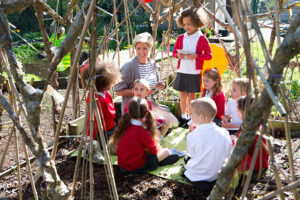
In a world where children are spending more time indoors and connected to screens, outdoor classrooms are becoming a popular and innovative approach to early childhood education. An outdoor classroom takes learning beyond the traditional four walls and immerses children in the natural environment, turning the outdoors into an enriching, hands-on learning space. This type of education encourages exploration, creativity, and physical activity, all while promoting a deeper connection with nature.
The concept of outdoor classrooms involves using nature as the primary setting for learning. Rather than confining children to desks and textbooks, teachers use the natural surroundings—trees, plants, rocks, and wildlife—to teach essential skills and concepts. This approach aligns with experiential learning, where children engage their senses and develop critical thinking skills by interacting with the world around them. Outdoor classrooms are designed to support all areas of development, including cognitive, social, emotional, and physical growth.
Here are three key benefits of outdoor learning:
- Enhanced Cognitive Development:
- Outdoor classrooms encourage children to observe, experiment, and ask questions. Nature provides endless opportunities for learning, from identifying different plants and animals to understanding weather patterns and ecosystems. Studies have shown that time spent outdoors can improve attention spans and problem-solving skills in young children.
- Improved Physical Health:
- Learning in nature promotes physical activity, which is vital for a child’s overall health and well-being. Outdoor classrooms often involve activities such as climbing, running, and exploring, which help build gross motor skills and increase physical endurance. The fresh air and natural light also contribute to better health, reducing stress and improving mood.
- Fostering Creativity and Social Skills:
- Outdoor learning environments encourage creativity and imagination. Children are free to explore and create using natural materials such as sticks, leaves, and stones. This unstructured play fosters teamwork, problem-solving, and communication skills as children work together to build, discover, and solve challenges presented by nature.
At Pine Tree Montessori, we embrace the philosophy of outdoor learning and have integrated it into our daily routine. Our outdoor classroom is a space where children can explore the natural world while learning important life skills. From planting gardens to studying insects, our students engage with nature in ways that spark curiosity and a love for the environment. In addition, outdoor classrooms help children develop resilience, as they learn to navigate and adapt to changing weather and environments, building confidence and independence.
In conclusion, outdoor classrooms offer an enriching, dynamic learning experience that supports the whole child—mind, body, and spirit. By connecting children to nature, we help them develop a lifelong appreciation for the environment and a solid foundation of skills that will serve them well in all aspects of life. Learning beyond the four walls allows children to explore the wonders of the world, providing a unique, hands-on education that simply can’t be replicated in a traditional indoor setting.
